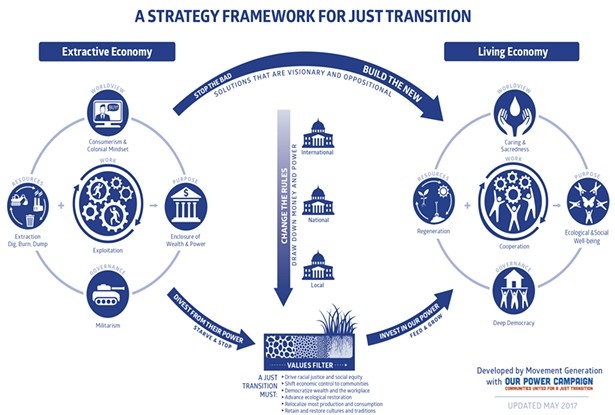Many of us are peering fiercely into the future, trying to figure out how to craft and navigate a "new normal," trying to see a future that prioritizes justice—and it can seem impossible to get there from here. The crises we are facing today are heavy and deeply rooted: racial injustice, climate change, the pandemic, a savage economic system that drives inequity for profit, and a disregard for basic human rights. It can seem too complex, and the changes we need can seem too sweeping. It is easy to succumb to discouragement or despair.
But we must make a change. Up ahead, there is a path that enlivens us, that honors all of us, that allows us to live together and thrive, in balance with the planet. We remember, "When there's a will, there's a way."
At Good Work Institute, we believe this way forward is to be found by all of us aligning around a clear framework of values that can help us move collectively in the right direction, toward health and wellbeing, economic revival, ecological renewal, and social healing for our region. The framework that can get us there is Just Transition, and Good Work Institute is providing a home base for it in the Hudson Valley.
What is Just Transition?
Just Transition is a national framework for advancing systems change at every level of society, articulated by the Oakland-based organization Movement Generation. Just Transition is a movement that answers the question: How can we move from this unjust economy to one that serves all people equitably and heals the planet? How can we build and restore cultures that celebrate and nurture all people, and heal the racial injustice that has caused countless tragedies? How can we re-center the original meaning of "economy," which is "the management of the home"?
The concepts of Just Transition emerged from the work of labor unions and environmental groups that were tackling the challenge of how to transition workers out of legacy, polluting industries, while protecting workers rights, creating sustainable jobs, and ensuring equitable wealth distribution. Much of the work was developed within communities of color and low-income communities, acknowledging the interdependence of environmental, racial, and social justice.
Just Transition has now developed into a broad vision for a more just future. It speaks to this urgent global moment of crisis by providing a clear set of principles for how we rebuild and redesign, so that we can step away from our current extractive, unjust economy, and move toward a regenerative economy that supports meaningful livelihoods and thriving local communities.
Just Transition has us see more clearly what we know intuitively to be true: That we are living in a moment of transition and that it is up to us to create the future world we know is possible. As my GWI colleague Micah says, "The current system is working exactly as designed. It's not broken." Some people are benefiting from this system and they are eager to extract their share. Therefore, in order to support the living world and ensure justice for all, we must step up now. We must show up, collaborate, create, and actively care for the people, places, and ecologies that support our collective wellbeing.
The five principles of Just Transition, as adapted by GWI, make clear what we need to accomplish to create that future.
• Advancing ecological restoration
• Democratizing communities, wealth, and the workplace
• Driving racial justice and social equity
• Relocalizing most production and consumption
• Retaining and restoring cultures and traditions
An Interdependent Framework
In the past, we have siloed solutions to the growing problems that we see in the world. That can be effective with linear problems, such as the successful eradication of smallpox. At other times, our solutions themselves can trigger devastating unintended consequences because we were too narrow in our understanding of the issue.To deal with climate change, we aim to reduce global greenhouse gases, but that doesn't address the root causes of increasing pressure on our planet: an economic dependence on constant growth and a continual extraction of resources; a laissez-faire approach to land stewardship that results in short-term profit gains and long-term ecological destruction; and an inability to connect local decisions with regional or even global impacts. What if we activated local communities to protect and steward the land instead? What if that launched a global movement to restore the health of our forests and other complex ecosystems, while investing in non-extractive industries, livelihoods, and living standards? Trees and jungles have tremendous carbon sequestration potential—and frankly, who wants to live on a planet that is largely paved and dead, even if we did manage to bring down greenhouse gas emissions?
With a global pandemic now rippling beyond a health crisis into social and economic collapse, the fragility and terrible inequity of our current systems are revealed. Our problems are interconnected in a way that resists siloed attempts at solving them, and a vast majority of people are too vulnerable. The promise of free market capitalism, supported by neoliberal principles, has failed to materialize as a viable, healthy system for all.
Just Transition allows us to think and act differently and not get stuck in silos. It offers a different, holistic lens, so that we see all systems as interconnected and interdependent. It challenges us to rethink our own individual roles. It encourages connection, community, and collaboration.
What Is Your Good Work?
Many of us are disconnected. The current system relies on it: We disconnect our spending from our local economy, we disconnect our ambition from local meaningful work, we disconnect paid work from the heart-centered work of care, we dive into virtual worlds and disconnect from our neighborhoods, and we fail to listen across differences of opinion.
It is time to come together and redefine the complex, joyful dance of life, in balance with the people that surround us, grounded in our beloved places. Just Transition connects us to radical systems change, by bringing our attention back to action and healing, in community.
The Hudson Valley is emerging as a locus for this work. People and initiatives are already working collaboratively towards Just Transition, engaging in what we call Good Work, in a wide array of sectors. We can already feel their ripple effects.
At Good Work Institute, we aim to build our capacity as a community and provide access to support for the Good Work that moves us toward Just Transition. To that end, we foster Just Transition skills, aligned projects and initiatives, communities of practice, and a network of people and organizations in the region. We offer workshops and trainings, we act as a partner for developing ideas, we provide facilitation, we design new ways to share resources, we teach Just Transition principles, practices and tools, and we opened a building in Kingston in October 2019 called the Greenhouse, that is a community home base and shared space for Just Transition in the Hudson Valley.
How to get involved
• Join groups in your local community that are organizing around issues that you care about.
• Reassess your own toolset and what we call your Good Work. This isn't just your day job, but rather what it is you are committed to in your life that is meaningful, and reflect on how that connects to the principles of Just Transition. We can't all solve every problem. But if we each commit to solving something directly in front of us, there would be a massive sea change in our sense of empowerment and our impact in the world.
Helene Lesterlin is a Worker Trustee at the Good Work Institute. Join the GWI Network: Sign up for our mailing list, participate in our programs, subscribe to our social channels and read our blog. Visit Goodworkinstitute.org for more information.













